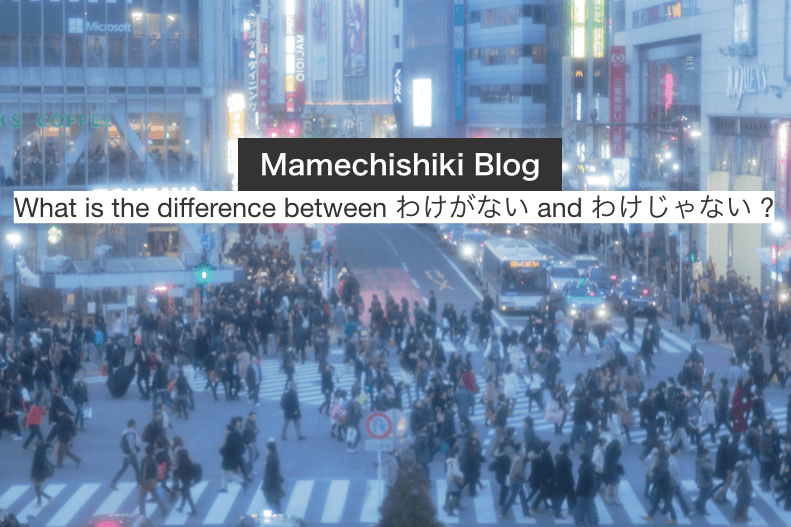
わけがない (wake ga nai) vs. わけじゃない (wake ja nai) – What’s the Difference?
When learning a language, memorizing words can be a tricky thing, especially when they look so similar.
By the way, have you ever asked yourself these kinds of questions?
- “Wake ga nai” and “wake ja nai” look alike—what is the real difference?
- I know each meaning, but I keep mixing them up. How can I stop?
- How do I correctly use wake ga nai, wake ja nai, and wake dewa nai?
If so, no worries!
In this article, you’ll learn how these two look-alike expressions actually serve very different purposes :
わけがない
and
わけじゃない
🚀 Deep breath, eyes focused on the screen—let’s start studying!
わけがない (wake ga nai)
Meaning
わけがない (訳がない) literally means “there is no way that…” or “there is no reason for that.”
訳 (わけ, wake) means “reason” or “purpose,” so 訳がない refers to something with no reason to occur.
It denies possibility—moral, physical, or logical.
Structure
| Type | Pattern |
|---|---|
| Verb | dictionary form + わけがない |
| i-adjective | adjective + わけがない |
| na-adjective | stem + わけがない |
| Noun | noun + の (or である) + わけがない |
💡 Pro Tip: In casual speech you can drop “が.” Formal: わけがありません.
Examples
JP: こんな素敵な手紙を捨てるわけがない。
Romaji: konna sutekina tegami wo suteru wake ga nai.
EN: There is no way I could possibly throw out such a beautiful letter.
JP: スパイスを入れすぎたでしょう?このカレー、美味しいわけがない。
Romaji: supaisu wo iresugita deshou? kono karee, oishii wake ga nai.
EN: You added too much spice, didn’t you? There’s no way this curry tastes good.
JP: 秋葉原は静かなわけがないでしょう!
Romaji: akihabara wa shizukana wake ga nai deshou!
EN: There’s no way Akihabara can be quiet!
JP: 確かにこの影の形が像にみえるけど、こんな場所だから像のわけがないでしょう。
Romaji: tashikani kono kage no katachi ga zou ni mieru kedo, konna basho dakara zou no wake ga nai deshou.
EN: The shape of this shadow looks like an elephant, but in such a place, there’s no way it’s a real one.
わけじゃない (wake ja nai)
Meaning
わけじゃない is the casual form of わけではない (polite: わけではありません). It means “it does not mean that…”. It is often used to emphasize that one fact doesn’t necessarily lead to another.
Structure
| Type | Pattern |
|---|---|
| Verb | dictionary form + わけじゃない |
| i-adjective | adjective + わけじゃない |
| na-adjective | stem + わけじゃない |
| Noun | noun + だという + わけじゃない |
💡 Pro Tip: Polite forms are わけじゃありません, わけじゃないです, or わけではありません.
Examples
JP: この課題の難易度がかなり高いですが、解けないわけではないと思います。
Romaji: kono kadai no nanido ga kanari takai desuga, tokenai wake dewa nai to omoimasu.
EN: The level of difficulty of this problem is kind of high but it doesn’t mean it’s impossible to solve.
JP: トマトアレルギーだから、食べられないわけではないけど、食べない方がいい。
Romaji: tomato arerugii dakara taberarenai wake dewa nai kedo, tabenai houga ii.
EN: I am allergic to tomatoes. It’s not that I cannot eat them, but it’s better if I don’t.
JP: 彼があんまり料理しないけど、彼の手料理がまずいわけじゃないと思う。
Romaji: kare ga anmari ryouri shinai kedo, kare no teryouri ga mazui wake janai to omou.
EN: He cooks rarely but it does not mean his cuisine tastes bad.
JP: うるさい訳じゃないですが、音楽を止めてもらってもいいですか?
Romaji: urusai wake ja nai desu ga, ongaku wo tomete morattemo ii desuka?
EN: It is not like it is really noisy, but would you stop your music please?
Summary
As a summary, memorize わけがない as “NO WAY” and わけじゃない as “It is not that… but…”.
Enjoyed this article? Feel free to share it or contact us on social media or via our Contact Us page to let us know your opinion!




